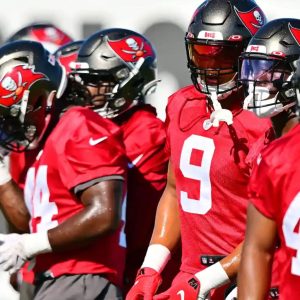The way the Kansas City Chiefs handled their business with cornerback L’Jarius Sneed could get the team in trouble. The Chiefs are set to send Sneed to the Tennessee Titans in exchange for a third-round pick and a seventh-round pick.
The Chiefs made the move a few weeks after applying the franchise tag to Sneed. The timing of the trade was curious because the Chiefs didn’t get the second-round pick they wanted. They settled for a third-round pick and change in a bid to clear up nearly $19.8 million in cap space to land more free agent help this offseason.

The Kansas City Chiefs made a questionable trade
The Chiefs’ decision dumbfounded Jeff Howe with The Athletic. He gave the Chiefs an “F” grade for the trade because the Chiefs lost a key player for their threepeat and didn’t stand to gain much more than if Sneed left Kansas City as a free agent:
It’s also likely he would have helped the Chiefs get a 2026 third-round compensatory pick if he walked in free agency a year from now. So the Chiefs gave up a season of Sneed for a better third-round pick a year earlier. That logic would work for some teams, but it doesn’t make as much sense for a perennial Super Bowl favorite amid a dynasty.
Granted, even if the Chiefs received a compensatory third, it would have been lower than what the Titans were set to pick in the third.
Did the Chiefs break CBA rules when trading L’Jarius Sneed?
Mike Florio with NBC Sports was also confused by the Chiefs’ decision and thinks the front office might have flirted with breaking Collective Bargaining Agreement rules on the matter. Florio suggests the Chiefs didn’t intend to extend Sneed when they placed the franchise tag on him, which isn’t allowed under the current rules set by the NFLPA:
“At some point, that approach potentially runs afoul of Article 4, Section 8(b) of the Collective Bargaining Agreement, which provides that “[a] Club extending a Required Tender must, for so long as that Tender is extended, have a good faith intention to employ the player receiving the Tender at the Tender compensation level during the upcoming season.”
It’s not supposed to be a device for trading the player. The team is supposed to want to keep the player, at least for another season. In this case, it could be argued (if Sneed or the NFL Players Association were inclined to make the argument) that the Chiefs did not have a good-faith intention to to employ Sneed in 2024.”
The Chiefs’ decision to tag and trade Sneed for a little bit more than a compensatory pick is a major red flag because it doesn’t signal the team was even interested in keeping him on for the 2024 season when Sneed could have become a free agent in 2025.
There haven’t been many reports about the Chiefs and Sneed seriously working on a long-term deal. The most I’ve seen is Sneed saying he wanted to stay in Kansas City. Whereas, Per Nate Taylor with The Athletic, the Chiefs believed they had enough talent in their secondary to be okay in the upcoming season, especially if they add help at cornerback in the draft:
One reason the Chiefs are willing to trade Sneed is because of their success in identifying talented cornerbacks and selecting them in the draft. Without Sneed, the Chiefs would still have three starting-caliber players in Trent McDuffie, Joshua Williams and Jaylen Watson.
Sneed lost leverage in the tag and trade
The crude part of this “business” decision is that it’s a calculated decision by the Chiefs front office that screwed over Sneed in his contract negations. This is why the move might not have been legal if the Chiefs had no serious intentions of keeping Sneed. Per Florio, Sneed will lose money by not hitting free agency:
“And that’s the problem, from Sneed’s perspective. Whatever the contract is that he gets from the Titans, he would have gotten more if he’d become an unrestricted free agent on the first day of the 2024 signing period.”
Now, the ball is in the NFLPA’s court to investigate whether the Chiefs were even interested in keeping Sneed for the 2024 season or beyond.





